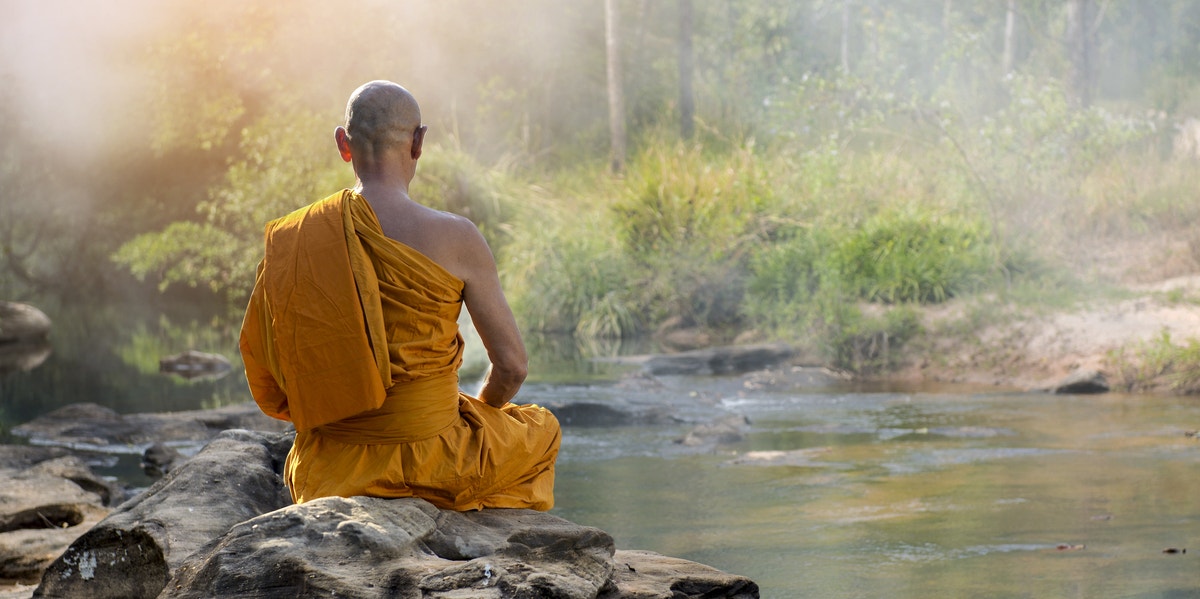What I Learnt From The Happiest Person In The World
His name is Matthieu Ricard and he is a Buddhist monk.
 Sunti / Shutterstock
Sunti / Shutterstock Being happy is not a competition. Or at least, I thought it wasn’t. But Google tells me there is a man who has won this race and been named the happiest person in the world. In fact, there has been scientific research done to prove this claim.
RELATED: 10 Items To Stop Counting If You Want To Be Truly Happy
“The scans showed that when meditating on compassion, Ricard’s brain produces a level of gamma waves — those linked to consciousness, attention, learning, and memory — never reported before in the neuroscience literature”, said Richard Davidson, the neuroscientist from the University of Wisconsin.
His name is Matthieu Ricard. He is 75 years old and lives in Nepal in a Buddhist monastery. Prior to becoming a monk, he was a scientist and received his Ph.D. in molecular genetics.
So, how did he do it? Well, Ricard himself has said that anyone can be the happiest person in the world if they look for happiness in the right place. The problem is that we tend not to.
As a Buddhist monk, he meditates a lot. According to him, by sitting and cultivating compassion, our mind will change, our brain will change, and then our lives will change. All by dedicating a few minutes a day, every day. Ricard also talks about spending a few minutes thinking happy thoughts every morning.
My experiment
Can simply meditating make someone a happier person? I decided to try this for myself.
I made myself meditate for ten minutes every day for a month. Now, I am sure Matthieu Ricard meditates way more than this but since I am a beginner, this was a good place for me to start.
The first day I looked for a guided meditation video on YouTube and sat alone in a room with my legs crossed and eyes closed. I won’t lie. It was difficult and I don’t think I did a very good job. I kept getting distracted. But by the end of the ten minutes, there were tears on my cheeks!
What? I didn’t understand. I wasn’t sad but I was crying. Why? A quick online search told me it was quite common for people to cry after a meditation session. I also felt much lighter. Earlier that day I was stressed about an upcoming project but after that meditation session, I was calm. I knew I had enough time to complete that project and I didn’t have anything to worry about.
I continued doing this every day for the whole month. I cried again a few more times but every time I meditated, I felt so good. Was this the happiness Ricard talks about? Maybe.
Now, of course, I’d feel distracted sometimes. Those 10 minutes weren’t flawless by any means. I’d get bored or feel like I wanted to do something else, which is normal because just sitting in silence isn’t exactly the norm for most people.
But I didn’t go into this thinking I was going to come out on the other end feeling like a much happier version of myself. I don’t even know what that means or what that would look like. I went into it with an open mind, curious to how I would feel being in a state of mind where I’m devoting 10 minutes straight, every day, wishing love and compassion upon others and upon myself.
And quite frankly, it felt really good.
However, those positive emotions didn’t really last for very long once I was done with the 10 minutes. I believe for any lasting change, I’ll have to meditate a lot longer than ten minutes a day for a month.
RELATED: What Buddhists Believe & 20 Buddha Quotes On Healthy Living
The Takeaway
I highly recommend everyone to try meditation at least once. But not because meditation holds the secret key to happiness. In fact, I learned that meditation isn’t where happiness is — the happiness already exists within you, meditation helps dig it out.
In fact, happiness looks different for different people. Here are some popular personalities describing what happiness means to them.
Paulo Coelho wrote in The Alchemist, “If you can concentrate always on the present, you’ll be a happy man.”
Helen Keller said, “A happy life consists not in the absence, but in the mastery of hardships.”
“I hope everybody could get rich and famous and will have everything they ever dreamed of so they will know that is not the answer to happiness,” said Jim Carrey.
Jane Austen wrote, “A large income is the best recipe for happiness I ever heard of.”
Meditation helps us understand what happiness means to each of us. For some it’s getting 10k views on an article, for some, it’s eating ice cream on a hot summer day.
Ricard says that the feelings of love and happiness are often fleeting because once they occur, we’re quick to move on to the next thought. So rather than doing that, one should concentrate on not letting your mind get distracted and keep focused on the positive emotions for an extended period of time.
After following Ricard’s advice for 30 days, I learned that our thoughts hold way more power over us than we realize. And just by changing the way we think, we can truly change our lives.
RELATED: What Is Buddhism? + 6 Meditations To Find Your Inner Zen
Vidhipssa Mohan is a writer who focuses on love and mental health. She has been featured in Medium, Notion Press, The Startup, and more. Follow her on Twitter.

